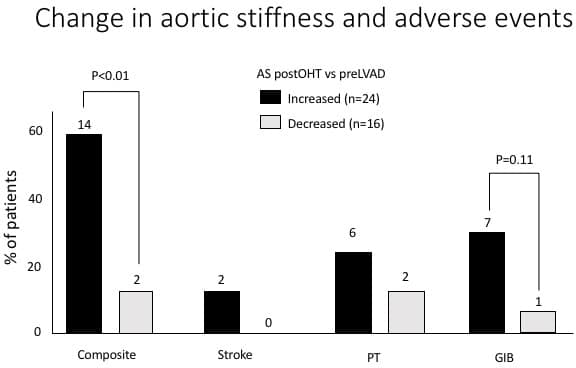In the general population, increased aortic stiffness, a measure of larger artery distensibility, is associated with an increased risk of cardiovascular events. It has been previously demonstrated that continuous-flow left ventricular assist device (CF-LVAD) patients have increased aortic stiffness, perhaps related to abnormal arterial blood flow patterns. In an investigational study we aimed to determine whether increased aortic stiffness in CF-LVAD patients is 1) associated with LVAD parameters, and 2) associated with adverse events, including stroke, gastrointestinal bleed (GIB) and pump thrombosis (PT). We studied 40 HeartMate II (HMII) pts (51 ± 8 yrs, 25% ischemic, 32% F), implanted between 1/2011 to 9/2017, with subsequent orthotopic heart transplant. Two dimensional transthoracic echocardiograms obtained prior to HMII placement and immediately after heart transplant were analyzed for aortic stiffness. A composite outcome of GIB, stroke, and PT was compared between patients who had increased vs. reduced aortic stiffness following LVAD support. Overall, aortic stiffness increased significantly following HMII support (AS: 10.6 to 9.6, p=0.06; DC: 4.8 to 4.1, p<0.0001; b-SI: 5.8 to 8,2, p=0.04), however a number of patients actually had decreased aortic stiffness. Patients with increased (N=24) compared to decreased aortic stiffness had significantly higher rates of the composite end-point of adverse events (58% vs 12%, OR 9.8 (1.81-53.07), p<0.01). Additionally, patients with increased aortic stiffness had a non-significant trend towards longer duration of time on CF-LVAD support support(627+572 vs 349+216 days, p=0.064), higher LVAD speed (9124 vs 8973 rpm, p=0.087) and less frequent use of ACE or ARB therapy (29 vs 56%, p=0.087). In conclusion, increased aortic stiffness in HMII patients is associated with significantly higher rates of adverse events while on CF-LVAD support. Further studies are warranted to determine the causality between aortic stiffness and adverse events, as well as potential modulators of aortic stiffness in CF-LVAD patients.
Physiology 2019 (Aberdeen, UK) (2019) Proc Physiol Soc 43, SA022
Research Symposium: Increased Aortic Stiffness in Continuous-Flow Left Ventricular Assist Device Patients is Associated with Higher Rates of Adverse Events
H. R. Rosenblum1, E. J. Stöhr1,2, W. K. Cornwell3, M. Kanwar4, J. R. Cockcroft2, B. J. McDonnell2
1. Cardiology, Columbia University Medical Center/New York Presbyterian Hospital, New York, New York, United States. 2. Cardiff Metropolitan University, Cardiff, United Kingdom. 3. University of Colorado Anschutz Medical Campus, Aurora, Colorado, United States. 4. Cardiovascular Medicine, Allegheny General Hospital, Pittsburgh, Pennsylvania, United States.
View other abstracts by:
Figure 1. Increased compared to decreased aortic stiffness is associated with an increased rate of adverse events while on CF-LVAD support.
Where applicable, experiments conform with Society ethical requirements.

